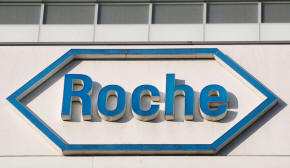Blow to Roche's cancer immunotherapy prospects as 2nd trial fails
 Send a link to a friend
Send a link to a friend
 [May 11, 2022]
By Ludwig Burger [May 11, 2022]
By Ludwig Burger
(Reuters) -Development of a new cancer
immunotherapy pioneered by Roche was thrown in doubt on Wednesday when
the drug, tiragolumab, failed to slow progression of lung cancer in a
second trial.
In a study, a combination of tiragolumab and Roche's established
Tecentriq drug did not slow disease progression in newly diagnosed cases
of advanced non-small-cell lung cancer when compared with patients on
Tecentriq only, the company said.
That was after tiragolumab in March failed to slow progression of a
different, more aggressive form of lung cancer.
Roche shares were seen 2.2% lower in bank Julius Baer's pre-market
trading.
The setback will likely give pause to more than half a dozen companies
working on similar compounds in a class of drugs called anti-TIGIT.
Merck & Co has been seen as closest behind Roche in that race.
Roche added that the trial would continue after the disappointing
interim readout to gather more data on tiragolumab's ability to prolong
the lives of trial participants.
"While these results are not what we hoped for in our first analysis, we
look forward to seeing mature overall survival for this study to
determine next steps," said Roche Chief Medical Officer Levi Garraway.

TIGIT is a receptor found on immune system cells as a backstop to
prevent misguided immune attacks against normal body tissue. Some cancer
types, however, exploit TIGIT to grow unnoticed by cell-killing immune
cells.
A similar mode of action is behind a blockbuster class of immune drugs
known as PD-1 and PD-L1, such as Merck & Co's Keytruda and Bristol-Myers
Squibb's Opdivo.
[to top of second column]
|

The logo of Swiss drugmaker Roche is seen at its headquarters in
Basel, Switzerland January 30, 2020. REUTERS/Arnd Wiegmann/File
Photo
 That multi-billion-dollar success
has pushed the industry to explore similar anti-cancer concepts,
such as anti-TIGIT, typically tested in a drug cocktail with
established PD-1 or PD-L1 drugs.
Gilead Sciences last November exercised an option to collaborate
with Arcus Biosciences on the anti-TIGIT drug domvanalimab.
GlaxoSmithKline in June 2021 struck a licensing deal worth up to $2
billion with iTeos Therapeutics Inc for an anti-TIGIT candidate.
Bristol-Myers Squibb and Agenus Inc are collaborating on a drug
under a May 2021 partnership.
Coherus BioSciences in January exercised an option to licence a drug
candidate by Shanghai Junshi Biosciences for the U.S. and Canadian
markets.
For Roche, which is seeking to offset a decline in sales due to
competition from cheaper copies of a trio of established cancer
drugs, more hope rests now on an experimental Alzheimer's drug for
which trial results are expected later this year.
(Reporting by Ludwig Burger in Frankfurt Additional reporting by
John Revill in Zurich; Editing by Tom Hogue)
[© 2022 Thomson Reuters. All rights
reserved.] This material may not be published,
broadcast, rewritten or redistributed.
Thompson Reuters is solely responsible for this content.
 |